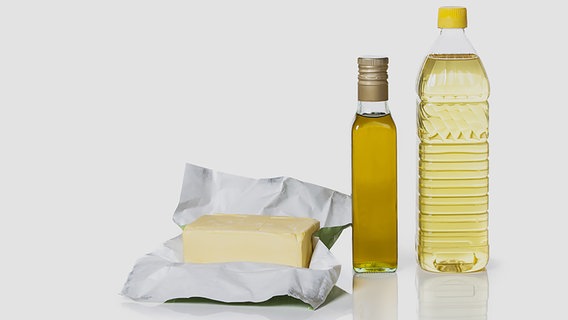As of: January 12, 2024 2:56 p.m
Yoghurt, quark and skyr contain a lot of high-quality protein and calcium. They are therefore considered healthy. But not every dairy product is recommended for everyone. Who should enjoy them in moderation?
Dairy products such as yogurt and quark, but also the Icelandic dairy dish Skyr, which has been very popular in Germany for several years, contain a lot of high-quality protein, calcium and saturated fatty acids. The composition of nutrients is considered healthy. However, if you are overweight or have high cholesterol levels, you should only eat them in moderation or switch to alternatives with less fat.
It is better to avoid ready-made products with fruit
Yoghurt, quark and skyr with industrially produced fruit preparation can contain artificial flavors and large amounts of sugar – on average an amount of up to six sugar cubes per cup. Therefore, it is better to prepare the natural product with fresh fruit.
Production of yoghurt, quark and skyr
To make yoghurt, quark and Skyr, different substances are added to milk:
- At yogurt Lactic acid bacteria ferment the milk sugar. The type of bacteria determines the consistency and taste – mild or sour.
- At Quark The milk is mixed with rennet, a coagulating ferment from calf stomachs. The enzymes chymosin and pepsin contained in the rennet cause the milk to curdle (curd). Cream is also added. This means that the fat content is higher than in yoghurt: for low-fat quark it is up to 10 percent, for semi-fat curd it is up to 20 percent and for cream curd it is up to 40 percent.
- Skyr is acidified with bacteria like yogurt and thickened with rennet like quark. Skyr tastes more sour than quark and the consistency is firmer and creamier than yoghurt. Some producers point to Skyr’s Icelandic origins, but the product is mostly made in Germany.
Protein: Important for muscles
Yoghurt, quark and skyr contain different amounts of protein. Depending on the product, there are between around four and twelve grams of protein per 100 grams. For yoghurt it is around four to five grams, for skyr it is eleven grams and for quark it is around twelve grams. The individual protein requirement depends on body weight and can usually be covered by a balanced diet. Proteins play an important role in various areas of the body:
- Formation of muscles and bones
- Transport of fat and oxygen
- Absorption of iron
- Defense against pathogens
- Repair of defective cells
- Health of nails and hair
- Production of connective tissue and cartilage
Dairy products are rich in calcium
The German Society for Nutrition recommends daily for healthy adults Intake of 1,000 milligrams of calcium. The nutrient is important, among other things, for building bones. There is a particularly high amount of calcium in dairy products:
- Quark: 90 milligrams per 100 grams
- Yogurt: 130 milligrams per 100 grams
- Skyr: 150 milligrams per 100 grams
- Milk: 118 to 122 milligrams per 100 milliliters
Important: Do not eat calcium-rich foods all at once, but spread them out throughout the day.
Fat content of dairy products
Dairy products also contain saturated fatty acids. These can increase bad LDL cholesterol in the blood, which can promote the development of cardiovascular disease, vascular calcification, dementia and diabetes. Foods containing saturated fatty acids are necessary in moderation for a balanced diet. The nervous system needs saturated fat as a messenger.
This is how much fat dairy products contain per 100 grams:
- Skyr: 0.2 to 0.5 percent
- Skimmed milk yogurt: 0.5 percent
- low-fat yogurt: 1.5 to 1.8 percent
- Yogurt: at least 3.5 percent
- Cream yogurt: at least 10 percent
- Low-fat quark: less than 10 percent
- Half-fat quark: 20 percent
- Cream quark: 40 percent
- Double cream level: 65 to 85 percent
People of normal weight can eat half-fat quark without hesitation. From a nutritional perspective, cream quark with a fat content of 40 percent is not recommended for anyone.
| product | Fat (%) | Protein (g) | Sugar (g) | Kcal | Salt (g) |
|---|---|---|---|---|---|
| Low-fat yoghurt | 1.5 | 5.2 | 6.4 | 62 | 0.18 |
| Whole milk yogurt | 3.5 | 4.3 | 5.2 | 72 | 0.15 |
| Greek yogurt | 10.0 | 4.6 | 4.3 | 126 | 0.08 |
| lowfat quark | 0.3 | 12 | 3.9 | 66 | 0.10 |
| Quark, 20% fat | 4.3 | 11 | 3.7 | 97 | 0.10 |
| Quark, 40% fat | 9.8 | 9.3 | 3.5 | 139 | 0.10 |
| Skyr nature | 0.2 | 11.0 | 4.0 | 62 | 0.08 |
| Fruit Skyr | 0.1-0.3 | 7.0-9.3 | 4.6-12.0 | 56-86 | 0.05-0.13 |
Further information




